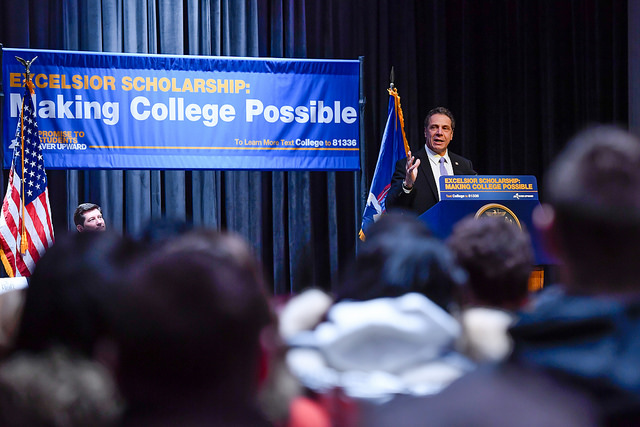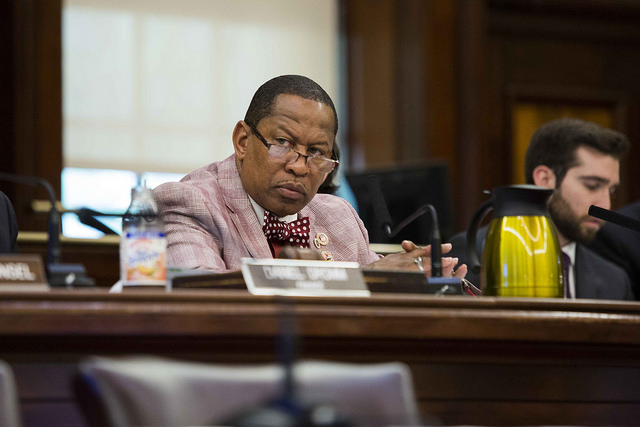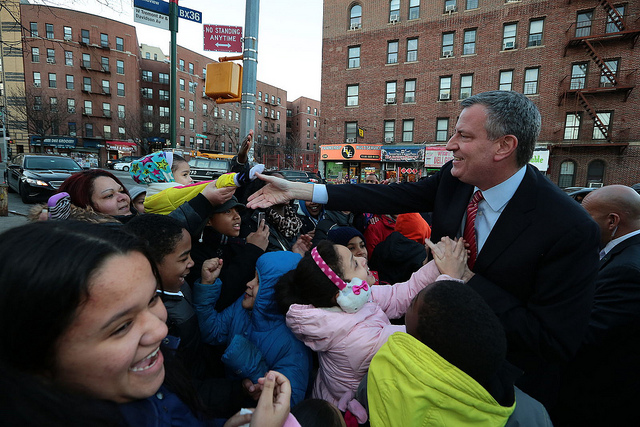New York Trails Neighbors in Helping Dreamers Achieve an Education

(Photo via the Governor's office)
Governor Andrew Cuomo has talked a big game about supporting immigrants in New York. Yet well over a year after Donald Trump’s inauguration - and more than seven years into Cuomo’s administration - the governor has little actual legislation to show for all of his boasting.
One key bill, the New York Dream Act, which would open up state financial aid to undocumented immigrant youth, known as Dreamers, has passed the state Assembly five years in a row. But, without the governor’s political muscle behind it, the Dream Act has languished each session, stagnant in the Senate.
Meanwhile, though the governor likes to say New York is a progressive leader, its neighbors are bolting ahead of us in offering equal access to higher education. Last week, New Jersey Governor Phil Murphy signed his state’s version of the Dream Act into law. Connecticut passed a similar bill in April.
Dreamers across New York are looking at the inspiring victories of their peers across state lines and wondering: when will it be our turn?
The New York Dream Act is a commonsense bill that would help ease the cost of higher education for undocumented students by expanding access to state financial aid and letting immigrant families participate in college saving programs.
For most undocumented students in New York, the only way to afford higher education is by working while in school or taking on significant debt. As a result, only five to ten percent of the roughly 4,500 undocumented students who graduate from New York high schools every year can attend college.
Take the story of Ricardo Aca, an immigrant New Yorker whose family came from Mexico whne he was 14 years old to give him the opportunity to pursue a better life, including a college education.
When Ricardo finished high school, he found out that, because he was undocumented, he could not access the state financial aid he needed to afford a quality higher education. He began taking photography classes at LaGuardia Community College, realizing that he could earn money shooting events. To pay for his education, he also worked in restaurants and hotels for years. Even so, he could barely afford tuition and ultimately had to stop attending classes.
He only re-enrolled years later, this time at Baruch College, when Make the Road New York, a community organization based in Queens, helped him get a scholarship that covered most of his tuition. Next year, he’ll graduate at age 28, meaning it will have taken him 10 years to obtain a bachelor’s degree.
While Ricardo’s story has a happy ending despite the lost time, there are many other immigrant youth in New York that don’t have the blessing of a scholarship.
As the Trump administration pursues an ever-clearer anti-immigration agenda, states have a greater responsibility to step in and do what they can to protect immigrant communities.
Ten states have now passed legislation to offer undocumented students tuition support, including California, Minnesota, and Texas. Every day, New York’s failure stands out more and more. It’s particularly shameful given our state has the second-highest share of immigrants in the country -- higher than both New Jersey and Connecticut. And the Dream Act would be a clear boon to our state -- the bill would only cost New York around $25 million per year, a tiny fraction of its $168 billion budget, and more than make up for its cost through increased tax revenue and economic contributions to the state.
Immigrant youth across the state have for years called on Governor Cuomo to use his considerable power to pass the bill. But, while Cuomo has publicly supported it, he has never made it a top priority. Just this year, when Ricardo and other Dreamers went to his office in Albany to deliver petitions for the Dream Act, his staff locked the door and refused to let them in.
Thousands of undocumented students in New York every year lose the opportunity to improve their lives and the lives of their families because New York fails to provide the basic support to continue their education.
Governor Cuomo, the time for words has passed. Dreamers like Ricardo across New York are counting on you to make the New York Dream Act a reality. Let’s finally unlock the doors of opportunity for all in our state.
***
Ana Maria Archila is Co-Executive Director of the Center for Popular Democracy.
***
Have an op-ed idea or submission for Gotham Gazette? Email This email address is being protected from spambots. You need JavaScript enabled to view it.
Legalize To Our Demise

Council Member King, one of the authors (photo: Emil Cohen/City Council)
As we talk about legalizing marijuana, or cannabis, in New York, let’s look back on our nation’s history and see the good of endorsing harmful substances. We recognize that alcohol is legal, but let's face it -- it isn't good for you. Alcohol impairs judgement and making it easily available for adults means it is easily available for young people. For decades, our nation has seen alcoholism ruin marriages, families, and lives. We've seen countless alcohol-related vehicular deaths and alcohol-related activities destroy healthy academic careers and undo people's’ ability to go to work everyday.
Are we ready to have the conversation about the costs of legalizing another harmful substance?
Marijuana shouldn't be consumed by any young person, but our conversation recently on legalization has involved young black and brown men being policed unfairly, and all we seem hear is: let's legalize marijuana to end this unfair policing.
Can't we separate these issues? Of course we can, because they are indeed two separate issues. Poor policing has nothing to do with using drugs. If we want to deal with different policing strategies in communities of color and white communities, then that should be the conversation. Legalizing marijuana does not address those policing strategies. What it does is send a poor message to kids that smoking weed is OK.
***
Fernando Cabrera, Chaim Deutsch, Andy King & Ruben Diaz Sr. are members of the New York City Council representing portions of the Bronx and Brooklyn. On Twitter: @FCabreraNY & @ChaimDeutsch & @AndyKingNYC & @revrubendiaz
***
Have an op-ed idea or submission for Gotham Gazette? Email This email address is being protected from spambots. You need JavaScript enabled to view it.
For 34,000 Children and Their Parents, A Summer of Uncertainty and More At Stake

(photo via the Mayor's Office)
In the Fall of 2014, New York City took an important step forward with the rollout of universal after-school for all public middle school students. SONYC, or School’s Out NYC, provides 6th, 7th and 8th graders with a foundation for success by offering opportunities, beyond the traditional learning settings of a classroom, that allow them to explore their interests and abilities in sports and arts and youth leadership and more.
Mayor de Blasio said in his announcement at the time that “Middle school is often a make-or-break time in an adolescent's life—and we're determined to use all tools at our disposal to expand learning opportunities for the future shapers of our city."
In the first year of implementation, the SONYC after-school program offered a summer component, mirroring all after-school programs established during the Bloomberg administration. This was a positive step as research has proven summer camp programming is a critical component of child well-being and academic success. Among the tremendous benefits of summer programs, they help to close the achievement gap and aid with preventing “summer slide” learning losses. According to the National Summer Learning Association, summer learning loss accounts for two-thirds of the ninth-grade achievements gap in reading, and low-income youth lose two to three months of achievement each year.
However, since the summer of 2015, the de Blasio administration has annually threatened to cut more than $20 million for summer camp programming from the students enrolled in the after-school programs of the mayor’s creation. This money, or a portion of it, usually gets restored after negotiations with the City Council; however, this back-and-forth “budget dance” process leaves parents and programs scrambling at the last minute and anxiety-ridden until budget adoption. And as the budget is adopted in late June, these restorations naturally result in a smaller and smaller number of program slots, as ramping up a program, hiring staff, engaging parents, and enrolling students all takes time. The beginning of the summer is not the time to make these crucial funding decisions.
Once again, the de Blasio administration is planning to cut summer programs for over 34,000 middle-school students. Those most at risk of losing programming are the low-income working parents and families who are already facing many stressors in trying to make ends meet. Keeping their children safe during the summer months should not be one of them.
The proposed cut impacts children and families in every corner of the city but is particularly drastic in communities with the greatest needs. The community district of Brownsville is facing the biggest cut of nearly 1,600 slots despite having the highest child poverty rate in the city. Other hard-hit communities include East Harlem (1,281 slots), East New York (1,219 slots), the Rockaways (1,137 slots), East Tremont (1,097), Central Harlem (1,087 slots), and the Lower East Side (1,030 slots). Each slot represents a child who will not have an enriching and stable location to learn and grow this summer.
The budget dance for summer camp must come to an end! We must return to the original model that recognized that the families whose children engaged in after-school programming during the school year need summer camp opportunities that allow children to explore cultural and recreational interests and abilities and offer academic components that prevent summer learning loss.
We agree with Mayor de Blasio when he says New York City must become the fairest big city in America. Threatening to cut summer camp from 34,000 children, with a profound negative impact on the poorest communities of this city, is not fair! Playing the budget dance with funding for summer camp programs is not fair! Fairness demands that the de Blasio administration restore and baseline this funding - 34,000 children and their families are counting on it!
***
Jennifer March is executive director of Citizens’ Committee for Children of New York and a leader of the Campaign for Children. On Twitter @CCCNewYork.
***
Have an op-ed idea or submission for Gotham Gazette? Email This email address is being protected from spambots. You need JavaScript enabled to view it.




